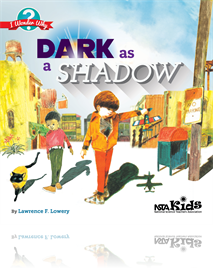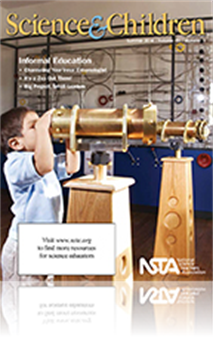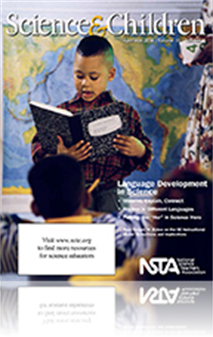All Elementary resources
NSTA Kids
Children's Choices Winner, Children's Book Council and International Literacy Association!...
NSTA Press Book
Dark as a Shadow: I Wonder Why
Time for shadow play! After reading about how light and objects interact to create shadows, young children won’t be able to resist twisting, wiggling, bending, and shaking to see the phenomenon for themselves. To add to the enjoyment, Dark as a Sha...
By Lawrence F. Lowery
Journal Article
Teaching Through Trade Books: Will It Sink or Will It Float?
This column includes activities inspired by children’s literature. This month’s trade books and accompanying activities help students investigate the concept of sinking and floating in more depth....
Journal Article
The Early Years: Inviting Parents to School
This column discusses resources and science topics related to students in grades preK to 2. This month’s issue discusses ways to help parents get involved in preschool science end engineering programs....
Journal Article
Engineering Encounters: Can a Student Really Do What Engineers Do?
Teaching second graders about properties using filter design within a 5E learning cycle....
NSTA Press Book
Introducing Teachers and Administrators to the NGSS: A Professional Development Facilitator's Guide
REVERE Award Finalist, PreK-12 Learning Group, Association of American Publishers!If you’re charged with helping educators achieve the vision of the new science standards, this is the professional development resource you need. This book is chock-f...
By Eric Brunsell, Deb M. Kneser, Kevin J. Niemi
Journal Article
Teaching Through Trade Books: The Poetry of Plants
This column includes activities inspired by children’s literature. This month’s issue integrates language arts and science using nature-inspired poetry picture books to engage students in explorations of plants' life cycles and needs....
Journal Article
Editor's Note: Building Language for Science Literacy
Science and Children’s editor shares thoughts regarding the current issue....
Journal Article
The Early Years: Creating Effective Classroom Interactions
This column discusses resources and science topics related to students in grades preK to 2. This month’s issue discusses learning about your own teaching to see if you are creating an effective learning environment....





